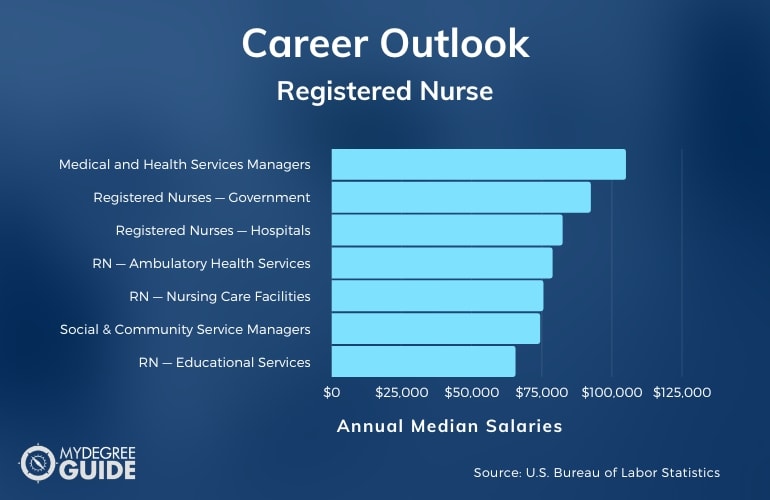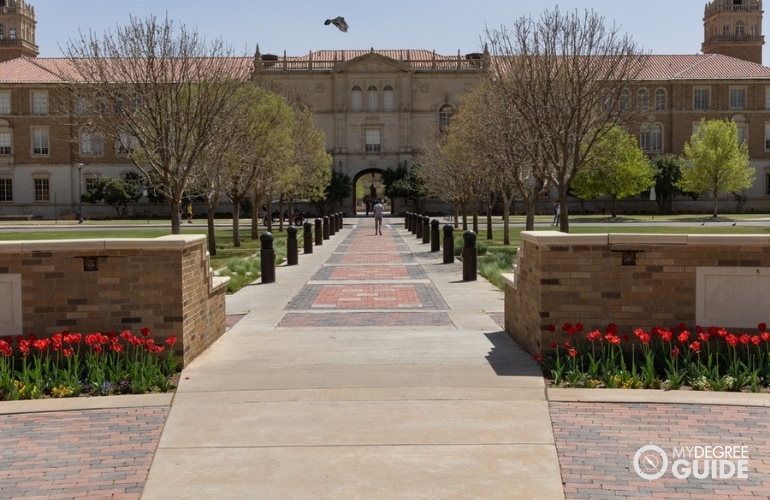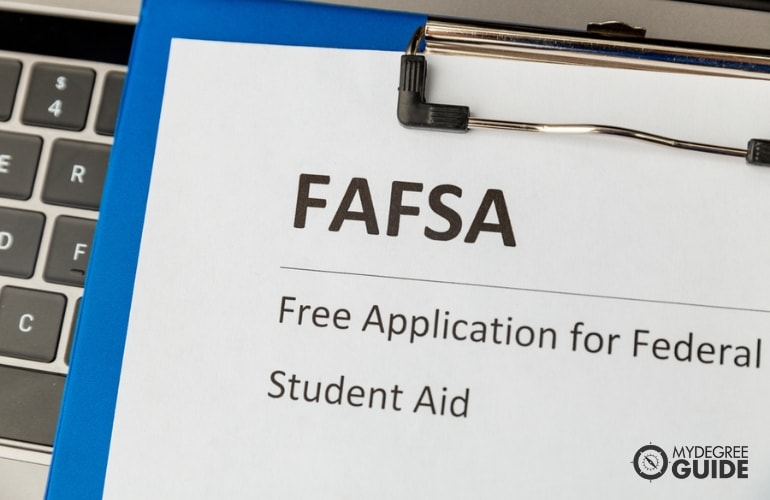If you are a registered nurse looking to take the next step in your education and your career, then a 6-month RN to BSN program might be exactly what you need.

This type of program is ideal for people who have earned their registered nursing credentials without completing a 4 year degree.
Editorial Listing ShortCode:
Getting your Bachelor of Science in Nursing (BSN) could be the key to new possibilities in your career. With a variety of accredited online nursing programs available, this degree could soon be within reach.
Universities Offering 6 Months RN to BSN Online Degree Programs
Methodology: The following school list is in alphabetical order. To be included, a college or university must be regionally accredited and offer degree programs online or in a hybrid format.
1. Chatham University
Students can earn their BSN through Chatham University’s RN-BSN program. All courses are fully online, and there are no residency requirements. Courses are 7.5 weeks long. The program starts in the fall and spring and may be attended full-time or part-time. The curriculum is competency-based, and up to 90 credits may be transferred in.
Chatham University is accredited by the Middle States Commission on Higher Education.
2. Lourdes University
Lourdes University offers an online RN-BSN program. All courses are entirely online and self-paced, offering the chance to move quickly through the coursework. An associate degree and a current RN license are required to apply. The program also requires at least 20 transfer credits and allows up to 90 qualifying transfer credits. A total of 120 credits are required to graduate.
Lourdes University is accredited by the Higher Learning Commission.
3. Metropolitan State University
Metropolitan State University’s innovative RN-to-BSN program. The program is designed for working nurses and is attended part-time. The program is fully online and competency-based. Cohorts begin each fall and spring. Two courses are taken each semester. Metro State designed the program with a focus on equity and anti-racism.
Metropolitan State University is accredited by the Higher Learning Commission.
4. Midwestern State University
Midwestern State University offers a BSN program designed for students who hold a current RN license. Dual enrollment is available with some community colleges. The program is fully online and may be started in the fall, spring, or summer. It can potentially be completed in 6 months if attended full-time.
Midwestern State University is accredited by the Southern Association of Colleges and Schools Commission on Colleges.
5. Northern Arizona University
Students at Northern Arizona University who are RNs may earn a BSN through the school’s competency-based learning program. The program is fully online, and students may take as many courses as desired in its 6 month sessions. At least 30 credit hours must be completed through NAU. To attend the program, a current RN license is required.
Northern Arizona University is accredited by the Higher Learning Commission.
6. Oklahoma Christian University
Oklahoma Christian University offers an accelerated RN-to-BSN program. The program can be completed fully online, and access to the whole program is acquired through a 4 month subscription. All courses are competency-based, and it may be possible to test out of courses. The program has start dates once per month, and it can potentially be completed in 4 months.
Oklahoma Christian University is accredited by the Higher Learning Commission.
7. Texas State University
Texas State University offers an RN-to-BSN program to students who hold an unencumbered nursing license. The program is fully online, and cohorts begin each fall. The program requires the completion of at least 120 credit hours, and students who already have an associate in nursing may be granted 30 credit hours. There is a foreign language requirement.
Texas State University is accredited by the Southern Association of Colleges and Schools Commission on Colleges.
8. University of Mary Hardin-Baylor
The University of Mary Hardin-Baylor offers an RN-to-BSN program designed for RNs who have an associate degree in nursing. The program is fully online, and all courses are competency-based. Students pay for six months of access to the MyWay program and may complete as many competencies as they wish per term.
The University of Mary Hardin-Baylor is accredited by the Southern Association of Colleges and Schools Commission on Colleges.
9. University of Toledo
A BSN may be earned through the University of Toledo. Accepted students must either hold an RN license and degree or may enter a dual enrollment program with a local community college to earn an RN and BSN. The RN-to-BSN program is fully online and competency-based. It can potentially be completed in 2 semesters.
The University of Toledo is accredited by the Higher Learning Commission.
10. University of Wisconsin – Milwaukee
The University of Wisconsin – Milwaukee offers a BSN program for students who have an associate degree in nursing, are diploma nurses, or are prelicensure ADN students. It is offered fully online, and competency-based assessments are offered. The program requires the completion of 124 credit hours and may be attended full-time or part-time.
UWM is accredited by the Higher Learning Commission.
Online 6-month RN to BSN Programs

You may have gone to school for just a year or two to earn your license as a registered nurse (RN). While that initial training launched your career, it may not be sufficient for the job advancement that you’d now like to achieve. For that, you may be required to earn a Bachelor of Science in Nursing (BSN).
Earning a BSN doesn’t require starting over with your schooling. Rather, the training and experience you’ve already gained may count toward your bachelor’s degree. As a result, you might be able to graduate with a BSN in less than a year. Your BSN program will likely focus on upper-level nursing classes. You may study:
- Advocacy
- Assessment skills
- Evidence-based nursing
- Health education
- Health insurance
- Leadership skills
- Nursing theories
- Public health
- Research techniques
- Working with patients of various ages
You may have some general education or nursing prerequisites to take as well. To earn your original nursing certification, you probably had to complete many clinical hours. But, if you select the easiest RN to BSN program online, you may not need to complete many clinical hours this time around. In some cases, no clinicals are required!
After your 6 month RN program, you may qualify for a supervisory nursing role or for a job with an employer who hires only BSN nurses.
Registered Nurse Careers & Salaries

After completing your RN-to-BSN program, you are likely to keep working as a registered nurse. You may be eligible to apply for new jobs, though, since some employers list a bachelor’s degree as a condition of employment.
The majority of RNs work in hospitals. Other common work settings include ambulatory healthcare services, long-term care homes, government agencies, and schools. While you might be overqualified for job openings for licensed practical nurses (LPNs) or licensed vocational nurses (LVNs), you may still be able to apply for such jobs.
According to the Bureau of Labor Statistics, the median salary for an RN is $81,220 per year. Median salaries for specific work settings as well as related occupations are listed below.
| Careers | Annual Median Salaries |
| Medical and Health Services Managers | $104,830 |
| Registered Nurses — Government | $92,310 |
| Registered Nurses — Hospitals | $82,250 |
| Registered Nurses — Ambulatory Health Services | $78,670 |
| Registered Nurses — Nursing and Residential Care Facilities | $75,410 |
| Social and Community Service Managers | $74,240 |
| Registered Nurses — Educational Services | $65,450 |
| Health Education Specialists | $59,990 |
| Licensed Practical and Licensed Vocational Nurses | $54,620 |
| Community Health Workers | $46,190 |
Having a bachelor’s degree could help equip you to take a leadership role in a healthcare organization. For example, you might be able to manage a team of nurses or home healthcare aides. With the proper certification, you could become a nursing home administrator.
Your nursing experience might be relevant for management roles in social or community service. You might be particularly well-suited for leadership in an agency focused on people’s physical or emotional well-being. Becoming a health education specialist could provide opportunities to guide people toward healthy choices. You could work for a health department, a hospital, or another health-focused organization.
Being a community health worker could be another option. This job often entails connecting community members to healthcare services. Completing an RN to BSN nursing program could be a stepping stone to enrolling in a Master of Science in Nursing (MSN) program.
An MSN degree could help prepare you to become an advanced practice registered nurse (APRN). APRNs have a median annual salary of $125,900 (Bureau of Labor Statistics).
Accelerated RN to BSN Curriculum & Courses

BSN studies include upper-division nursing classes to increase your knowledge and enhance your skills. There may be a limited number of clinical hours required as well. Here are some course examples:
- Assessment Techniques: You’ll learn how to conduct assessments of patients based on medical histories and physical exams.
- Evidence-Based Nursing Practices: In this class, the focus will be on reading, understanding, and conducting nursing research, and you’ll also discuss how to incorporate research-backed ideas into your professional practice.
- Gerontology in Nursing: You’ll learn to provide appropriate nursing care for older adults and support their physical and mental health needs.
- Health Policy: While you study the process of policy development for healthcare, you may also learn how to conduct advocacy efforts.
- Health Promotion: This course will equip you with techniques for providing health education and helping people make healthy choices.
- Lifespan Nursing: As you learn to provide nursing care for people of all ages, you may also discuss the importance of working with and supporting families.
- Nursing in Public Health: Studying epidemiology and health education can prepare you to work as a nurse in a community health setting, such as a local health department.
- Nursing Leadership: You can prepare to take an active role in heading up nursing teams as you study leadership skills and management practices.
- Payment and Patient Care: This class will offer a detailed look at topics like quality management, insurance reimbursement, and care coordination.
- Professional Practices for the Registered Nurse: As the introductory course for your program, this class may review communication, healthcare law, team dynamics, multiculturalism, and other relevant topics for the professional RN.
These classes will complement the general education and nursing-specific coursework that you have previously completed. In addition, you may take some other gen ed courses to fulfill the requirements of a bachelor’s degree program.
6 Month RN to BSN Program Admissions Requirements

Before applying to the best online RN to BSN programs, it’s beneficial to review a school’s application requirements to make sure it’s a good fit. Here are some common admissions requirements:
- ACT or SAT test score (not needed for all schools)
- Minimum college GPA of 2.0 or 2.5 (depends on the college)
- Active RN license
- Transcripts from all previous college programs
There may be certain general education prerequisites that you’re required to have completed before beginning your BSN studies. A minimum grade may be required.
Fast Track RN to BSN Online Programs Accreditation

It’s important to select a college for your BSN based on accreditation status. Reputable schools hold regional accreditation. The accreditation process involves reviewing an institution to ensure it provides solid educational experiences.
Regional accreditation can benefit you in multiple ways. For starters, licensing boards and hiring committees often consider whether you have received an accredited education. Also, you would likely need a regionally accredited BSN to be admitted into a graduate nursing program.
6 Month RN-BSN Programs CCNE Accreditation
While regional accreditation is important for students in any field, there’s another type of accreditation that nursing students should consider as well. The Commission on Collegiate Nursing Education offers programmatic accreditation for nursing studies.
When you choose a CCNE accredited program, you can rest assured that you’ll be receiving an education that meets industry standards. In addition, this will be beneficial to professionals seeking a career change and looking into accelerated BSN programs for non nurses. You can be confident that you’ll be well prepared for the workforce. A CCNE accredited program may be a stipulation for licensure in your state.
Financial Aid and Scholarships

Financial assistance programs may ease your process of earning a bachelor’s degree. You can learn about your options for government help by submitting the Free Application for Federal Student Aid (FAFSA).
Through federal programs, you may qualify to receive grants and loans. Your state may provide similar assistance. Scholarships from your college or another organization may also lower your tuition expenses. After an application process, you might be chosen to receive a one-time or renewable award.
It’s also possible your employer will help pay for you to enhance your education. You’re more likely to get this perk if your increased schooling would benefit your employer.
How Long Are RN to BSN Programs Online?

RN to BSN programs typically take 1 to 4 years to complete, depending on the university and your chosen specialty. It’s most common for these programs to last between 1 and 2 years. Those on 3- or 4-year tracks may be part-time students.
Some fast online degrees can be completed in just 6 to 9 months. The fastest RN to BSN program online options often include year-round classes that are each 8 weeks long. It can help to have many transfer credits. You may complete a bachelor’s degree more quickly if you have an associate degree rather than a nursing diploma.
Getting Your RN to BSN in 6 Months Online

To increase your potential as a professional nurse, you could look into accredited online RN to BSN programs. Getting a college degree may help you work toward promotion opportunities, leadership roles, and increased confidence.
You’re already a busy nurse, so committing a lot of time to school may not be in the cards. In that case, you might appreciate the speed of accelerated RN-to-BSN degree completion programs. Some students manage to graduate in just 6 months!
If you’re ready to start your journey toward a bachelors degree, you can check out your options for RN-to-BSN studies from accredited colleges today offering accelerated nursing programs online.
